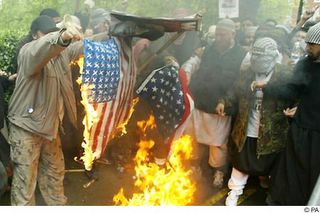Monday, May 30, 2005
Cutco on the Chopping Block
Friday, May 27, 2005
Wednesday, May 25, 2005
Fallaci charged in Italy with defaming Islam
By Crispian Balmer
Reuters
Wednesday, May 25, 2005; 8:13 AM
ROME (Reuters) - A judge has ordered best-selling writer and journalist Oriana Fallaci to stand trial in her native Italy on charges she defamed Islam in a recent book.
The decision angered Italy's justice minister but delighted Muslim activists, who accused Fallaci of inciting religious hatred in her 2004 work "La Forza della Ragione" (The Force of Reason).
Fallaci lives in New York and has regularly provoked the wrath of Muslims with her outspoken criticism of Islam following the Sept. 11, 2001, attacks on U.S. cities.
In "La Forza della Ragione," Fallaci wrote that terrorists had killed 6,000 people over the past 20 years in the name of the Koran and said the Islamic faith "sows hatred in the place of love and slavery in the place of freedom."
State prosecutors originally dismissed accusations of defamation from an Italian Muslim organization, and said Fallaci should not stand trial because she was merely exercising her right to freedom of speech.
But a preliminary judge in the northern Italian city of Bergamo, Armando Grasso, rejected the prosecutors advice at a hearing on Tuesday and said Fallaci should be indicted.
Grasso's ruling homed in on 18 sentences in the book, saying some of Fallaci's words were "without doubt offensive to Islam and to those who practice that religious faith."
MUSLIMS HAIL DECISION
Adel Smith, a high-profile Muslim activist who brought the original law suit, hailed the decision.
"It is the first time a judge has ordered a trial for defamation of the Islamic faith," he told reporters. "But this isn't just about defamation. We would also like (the court) to recognize that this is an incitement to religious hatred."
Justice Minister Roberto Castelli, who has a prickly relationship with the Italian judiciary, said the ruling represented an attack on freedom of expression.
"In Europe we are seeing the birth of a movement that is looking to silence those who don't follow a single mindset, within which it is forbidden to speak ill of Islam, of homosexuals or of the children of homosexuals," Castelli was quoted as saying in an interview with Radio Padania.
"In Fallaci's book there is very strong criticism but not defamation," Italian news agency ANSA quoted him as saying.
There was no immediate comment from Fallaci who is in her 70s and suffers from cancer.
Just weeks after the Sept. 11 attacks, Fallaci published "La Rabbia e l'Orgoglio" ("The Rage and the Pride"), in which she said the West was superior to Islamic society and complained that Muslim immigrants had "multiplied like rats."
The book sold more than one million copies in Italy and at least 500,000 elsewhere in Europe.
Fallaci received numerous death threats following its launch and "La Forza della Ragione" was billed as her response to the outpouring of anger.
No date was set for the opening of the defamation trial.
------------------------------------------
HT: James White
Measuring your Marriage
What a good question. Really puts things into perspective when you think about it.
Rising star in Falwell orbit
|
LYNCHBURG, VA. -- The lecture at Liberty University was vintage Jerry Falwell -- the booming voice, the evangelical fervor, the jokes:
"The average mainline church doesn't say Jesus is the God; they say we all have our own truth. You're pushed to the outside if you say there is one God. It's like being on 'The Ricki Lake Show' all day long."
But the lecturer wasn't Falwell, the university's founder and chancellor. It was Ergun Mehmet Caner, a bald, goateed former Muslim from Turkey who is the new dean of Liberty's seminary. His Falwell-esque charisma and his unusual heritage have created a buzz that he is one of evangelical Christianity's future leaders.
Caner, 40, told his students that infighting Christians are like bored dogs "on a coon hunt" and declared that he had "straight-up hair envy" for a long-tressed contestant on "American Idol."
"The average Christian professor has been saved, sanctified and bored," he said in an interview before class. "These kids think theology is dry because we are dry."
Caner's star rocketed after the Sept. 11, 2001, terrorist attacks, when he became a controversial in-house expert on Islam for the evangelical Christian community. His 11 books have sold a quarter of a million copies, and he is booked as a speaker at churches years in advance. Falwell appointed him dean this spring, two years after he joined the faculty at Liberty, one of the nation's fastest-growing evangelical schools.
Caner said he believes his popularity among Christians is largely attributable to his Islamic heritage, a faith he said is linked inextricably with violence and sexism. Most of his books have focused on Islam's "trail of blood," as he calls Islamic history, and when prominent Southern Baptist leaders call Muhammad a "demon-possessed pedophile" -- angering Muslims worldwide -- they have cited Caner as their source.
"There's no doubt he is an incredible personality," said R. Albert Mohler Jr., president of the Southern Baptist Theological Seminary, the oldest such institution. Caner "brings the credibility of being on the inside."
The rapid rise of Caner -- as well as his brother and co-author Emir, recently named a dean at Southwestern Baptist Theological Seminary, one of the nation's largest Southern Baptist schools -- comes as evangelical Christians are pouring more resources into learning about Muslims, with the ultimate goal of converting them. Evangelical schools, like secular ones, are expanding their Islamic studies programs; seminars are being held on how to appeal to Muslims; and speakers such as Caner are beginning to preach in Islamic countries -- though he said he won't specify where because it is illegal in some places.
Opening up to cultures
Caner is among a group of young evangelical leaders who say their community has been willfully ignorant of other faiths, cultures and opinions, which has cut them off from the diverse wave of people immigrating to the United States. This group -- which includes the Caner brothers and Falwell's son Jonathan -- believes that evangelicals have to engage the culture and meets to discuss issues such as how to preach against homosexuality in an increasingly tolerant era and how to spot a Hindu by diet and dress.
"It's no longer enough to, say, understand a Mormon. You have to understand Jainism, Shintoism, Buddhism," said Caner, who plans to launch a master's degree in global apologetics, the defense of Christianity compared with the other world religions.
Most non-Western Muslims are ignorant of Christianity, Caner said, and Christians are decidedly illiterate in their own history as well. After hearing much post-Sept. 11 Muslim-bashing, he wrote his last book about the Crusades.
"That's where we went wrong," he said. "Forced faith isn't faith. You can't torture someone into believing in Jesus."
But at a time when Christian-Muslim relations are fragile, Caner's appointment, and that of his brother, worries some Muslims and more moderate evangelical leaders. They question why Caner uses isolated quotes out of historical context to sum up an entire faith and whether Liberty would have selected someone with no administrative background if it weren't for his power to attract controversy.
"This is not accidental," said the Rev. Charles Kimball, an ordained Baptist minister who directed the National Council of Churches' Middle East office and now teaches world religions at Wake Forest University. "It says, 'These are rising stars, and they will get even more visibility.' And this is all ratcheting up because of world events."
Critics question goal
Although Caner says his objective is to connect with other cultures, critics say that his only mission is conversion and that his comments prove his prejudice.
Ebrahim Moosa, professor of Islamic thought at Duke University, said in an e-mail that Caner's appointment sends the message that Liberty "does not wish to engage in a dialogue with civilization. ... It was a poor and regrettable decision, one that most credible institutions would avoid."
Greg Warner, executive editor of the independent Associated Baptist Press news service, said Liberty's choices are considered important because the school is growing so quickly and because Falwell is an international figure.
Although Christians hungry for information about Islam after Sept. 11 are increasingly open to Muslims, Warner said, conservatives still "look suspiciously" at the expanded dialogue.
"They don't want in the name of dialogue to obscure the claims of the Christian Gospel, particularly the exclusivity of Christ," he said. "Conservatives react to that and have been reluctant to join the chorus for more interaction between the faiths."
Interaction is what Caner said he wants. He said he refuses to go to Christian coffeehouses and prefers to hang out where he is the only Christian in the room so he can talk to non-Christians. But almost all the conferences and concerts he speaks at are for Christians, and almost all his students are evangelicals.
Caner was raised in Turkey and Sweden in an Islamic family before moving as a teenager to Ohio, where a friend took him to church and he embraced Christianity. Now he refers to both Muslims and evangelicals as "my people" and says he hopes moderate Muslims can bring change, and peace, to Islamic countries.
Saturday, May 21, 2005
It is our Islamic duty to see you are killed
Turkey’s Protestants Face Wave of Attacks
Anti-missionary threats turn into violence.
by Barbara G. Baker
In high-school-level Turkish, the writer threatened the safety of Wolfgang Hade and his family unless they left the country within a month. A German citizen, Hade is married to a Turkish national of Christian background.
“Your efforts to wear us down -- as the inheritors of a great race -- and alienate us from our values will come to nothing,” the writer declared. “Please forward this to the headquarters directing you.”
Together with his wife and small daughter, Hade has lived for the past three and one-half years in Izmit, near the epicenter of
The
“The aim was to burn the church down,” Hade told Compass. “There were black signs of burning and the window was partly broken, but the debris had been swept away.” On three separate occasions since, church windows have been broken out.
Local police investigated all of these attacks and the church installed iron burglar-bars to prevent damage to ground-floor windows. But after a Molotov cocktail was thrown into the upper floor on February 6, church leaders made an appointment with the local governor’s assistant.
“We sent a petition to the governor, and a local newspaper published part of it,” Hade recalled. “Then the attacks stopped. Until yesterday.”
The string of Izmit attacks are not isolated cases. Over the past six months, vigilante groups in at least four other Turkish cities have also threatened Protestant church workers and attacked their places of worship.
Media Fanned Intense Criticism
Simultaneously, the Turkish media has fanned intense criticism of Christian missionary activity. Even government ministers have spoken out, claiming that foreign missionaries had political motives aimed at “damaging the social peace and unity of
A government-approved sermon read out in Turkey’s mosques at Friday prayers on March 11 specifically warned worshippers against Christian missionaries, accusing them of pursuing political agendas to “deceive and convert” people.
Despite the democratic image presented by
In the Turkish capital of
Inflicting $10,000 in damages, the Molotov cocktails heaved into the church could have burned the entire church down if one of the fire bombs had not run out of fuel, said officials, who described the attack as “amateurish.”
“There had been many incidents of vandalism before this,” one leader of the English-language congregation said. “People have thrown rocks to break the large glass windows of the church, but this was more than that.” The liquid fuel singed the church carpet, with the walls and cabinets near the front of the sanctuary also damaged.
Several weeks before the attack, an email message had been sent to the pastor of the church’s Turkish congregation. “It is our Islamic duty to see you are killed,” the message warned. “The place you call a church will be wrapped around your heads.”
The following week, the U.S. Embassy in
In a subsequent news release, the Mazlumder human rights group condemned the “open violation of religious freedom” demonstrated by the
Last month, several acts of vandalism were also reported against the Agape House, a Protestant congregation in the Black Sea city of
According to Orhan Bicakcilar, the congregation’s Turkish pastor who lives in the building, the most destructive attack occurred on November 28 of last year, when the Agape House came under heavy stoning. This incident came shortly after the mayor of the city’s Atakum municipality had insisted that he would never allow a church to be opened there.
Meanwhile, a Turkish Christian living in
“I don’t know how much of a real threat this is,” he admitted. “I’m not afraid of people’s reactions, but I am afraid of threats against my family.” He said he never reported the incidents to the police because his brother had been told by a policeman that the authorities were “secretly watching” his group.
Life-Threatening Attack
Perhaps the most life-threatening attempt against the Protestant community has occurred in
In early November 2004, three young men allegedly “seeking spiritual truth” went into the
After wrestling Miller to the floor, the three youths bound, gagged and blindfolded him, declaring they had been given orders by Al-Qaeda to “put him away.”
After an hour and a half, during which they ransacked and looted his office, the attackers finally told Miller they would spare his life if he and his family left the country immediately. Although the incident was investigated by local police and the U.S. Embassy, and Miller later identified two of his attackers, it is not clear whether the three minors were charged or convicted of a crime.
“I am sure it was not Al-Qaeda, but a local group that is uncomfortable with the presence of a Christian church and foreign church workers here,” Miller told Compass.
Last month, two new incidents targeted the
“Lots of policemen combed the yard to see whether there was any other explosive device or clue,” a member of the congregation told Compass. A printed card like those sent to soldiers on active duty was found, inscribed “Protectors of the Motherland” with the handwritten names of two individuals in the fellowship.
On April 20, a similar bomb was left in front of the home of one of the Turkish Christians in the congregation. It exploded about 10:30 in the evening, startling the whole neighborhood.
Fear of Escalation
None of the attacks against Protestants have received coverage in the national press, in part because local Christians admit they are reluctant to be identified and harassed even further.
“But if there is no response to these incidents of violence and to the youths doing it, they will just continue,” APC press spokesman Isa Karatas told Compass. “It’s necessary to bring it up as an issue,” he said, particularly since officials in the local governor’s office and police force can often identify the troublemakers involved.
Turkey’s miniscule Protestant community consists of an estimated 3,500 Christians gathering in 55 designated places of worship, along with 40 other known house fellowships.
Friday, May 20, 2005
Islam is Peace...
Tuesday, May 17, 2005
Pictures on Klueg Blog
Quick Attention TV
On the way home from work today I was listening to the news announcer talk about the ending of the TV show “Everybody Loves Raymond.” I must confess that I have never seen the show, but it has been running for a total of nine years. The announcer was emphasizing that in today’s world television shows just don’t last that long. He said that the average run of a show is about 2 years and Raymond’s nine years was the exception. He attributed such a poor run time of most TV shows to what he labeled “quick attention TV.”
I had to laugh! Quick Attention TV. This is what he meant: in today’s world most shows do not last long because the viewing audience so often craves something new and fresh. Ever since I have read Neil Postman’s excellent work, Amusing Ourselves to Death, I have realized the sad and destructive effects of television. Postman’s thesis could be summed up very simply – TV makes us dumb.
Quick Attention TV disorder, I will call it, is just one of the side effects from television watching. Because everything is so fast paced on TV we have been conditioned by the television to expect things at a faster rate. Things just become faster and faster. The Internet is not exempt from this condemnation. Just ask yourself this question: would you be satisfied with 33.6K dial-up? I am still stuck on 56K and I often think it is too slow. We want things faster. We want change at a more rapid pace and when things slow down we struggle to pay attention and often are lost in our longings for speed.
Interestingly, this has not been kept out of the church. After all, do not the majority of churchgoers watch TV? Now 20-minute sermons are too long. The old Hymns of the faith are to slow. People need a commercial break. The congregation needs an exciting car chase. We need to see bullets flying and bodies falling. We have the need for speed and the church and the culture of the church are just too slow.
Instead of seeing the church as a break and quiet respite where we can come before the throne of the Almighty we are unsettled and often fidgety at about the 10-15 minute mark of the sermon – sometimes even the service. TV and the Internet have truly conditioned us. Yet, we need the church, we need the time before God engaging in worship with him. We need to slow down and at least for a while abandon our quick attention TV. To stand in the presence of Almighty God is no matter which can be accomplished in a 30 second commercial break. We don’t need sound bites; we need contemplation, prayer and careful thought of the Christ who so loved the world that he surrendered himself to the cross. As the church we must abandon the need for speed, we must reject the quick attention TV disorder and we must embrace Christ and him alone in all his glory in the sweet serenity of slowness.
Monday, May 09, 2005
Some things are just unplanned!
Nonetheless we are happy and very excited. The Lord has laid a great challenge before us, but I believe we as a family are up to the task and we will only be stronger as a result. Well, without further ramblings we are pleased to announce...

Even I have to admit that he is pretty cute. On Saturday Sarah & Abby spotted him while garage sale-ing and there was a litter of six kittens being given away. They brought him home just as a joke, but I (in a moment of confusion and disillusionment) thought that it would be okay to have a kitten in the house. Well, Sarah and I discussed it for the remainder of the day and we picked him up on Sunday.

The kids are estactic. Abby is off the wall. Thankfully for her this is one laid back kitty. Every two minutes, "where is kitty...where is kitty. I want to hold him...where is kitty." And then once she has captured him she just carries him around.

It is kind of funny since I don't really like cats, but knowing my kids I kind of see this as a form of kitty torture! :) Hee hee hee!

This is my favorite picture. Abby doesn't quite know how to gently handle him yet, although she is getting better.

We don't have a name for him yet - any suggestions?
Making Boys into Men
Sunday, May 08, 2005
Saturday, May 07, 2005
Thursday, May 05, 2005
Target

I will be working four 10 hour days (Tuesday - Friday). It will be nice to have a three day weekend and even on the weekday I will still be home before dinner time. My hours are 6am to 4pm.
Here is an article from the local paper on the start up of Target's distribution center.
























